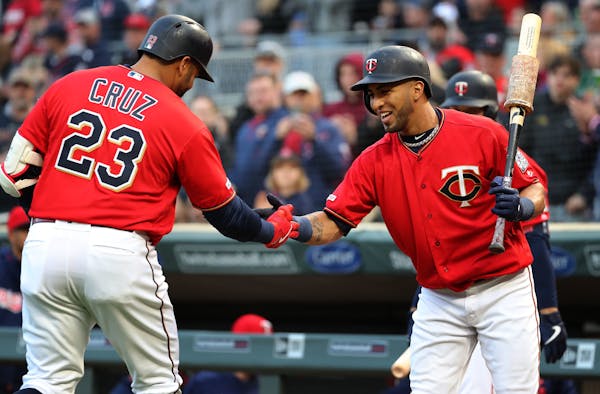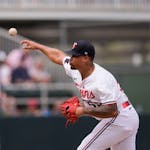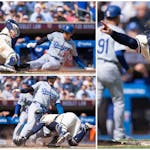Byron Buxton came to bat with two outs in the seventh inning of a June game against Seattle.
Mariners pitcher Mike Leake had thrown only two pitches in recording those two outs — a lineout to left field by Jonathan Schoop and a lineout to right field by Jason Castro.
Buxton swinging at the first pitch would have qualified as a sin under baseball's unwritten rules. Except the 2019 Twins don't adhere to traditional batting laws.
Stats and more
2019 Twins statistics

Alas, Buxton didn't swing at the first pitch because it was a ball, but he felt no obligation to take a pitch.
"I'm not just going to give you a free strike," he said a few days later. "It's kind of our DNA. You throw us that first pitch and we want to hack at it."
Buxton had the green light at the risk of having a three-pitch inning?
"Absolutely, 100 percent," Twins hitting coach James Rowson said. "There is no rule."
A driving force behind the Twins' offensive explosion this season has been an aggressive mind-set from the first pitch of every at-bat. Hitters step into the box looking to hack, as Buxton puts it.
As a team, they rank fourth in Major League Baseball in first-pitch swinging percentage at 33.4%. Three Twins rank in the top 20 of MLB hitters in swinging at first pitches, led by Schoop at 44.3%.
"I'm an aggressive hitter, I'm not a patient hitter," Schoop said. "Maybe I've got to be a little bit more patient sometimes. But if I see something that I like in the zone, I'm going to try to do damage on it."
The entire lineup espouses that philosophy. The Twins rank last in MLB in pitches per plate appearance at 3.79.
Their approach is working. The Twins are on a record pace for home runs, while leading MLB in slugging percentage (.497) and on-base-plus-slugging percentage (.833) and tied for first in batting average (.272) and runs scored (509).
"We have a bunch of big strong guys in here that like to take their big hacks," right fielder Max Kepler said. "They have an aggressive approach, which has brought them success."
That philosophy represents a stark change. In the previous five seasons, the Twins ranked near the bottom of the league in first-pitch swing rate, in large part because of Joe Mauer's well-known patience.
Mauer's career-high first-pitch swinging percentage was only 14.1%, and his percentage finished in single digits in 10 of his 15 seasons. Mauer's retirement is a factor for the spike but doesn't entirely explain it.
Kepler swung at first pitches 21.9% of his at-bats in his first full season, 2016. He's swinging at first pitches 41.5% this season.
Buxton's first-pitch swing percentage has increased from 26.3% to 39.6% in four seasons.
"A lot of pitchers like to get a 'get-me-over pitch' and it's usually one of the better pitches to hit," Kepler said.
Hitters understand the value pitchers place on getting ahead in the count 0-1. So why automatically take in that situation?
"I'm a firm believer that you want to swing at the best pitch in the at-bat," first baseman C.J. Cron said. "If that happens to be the first one and that's going to give you the best chance to succeed, you may as well swing."
Same thing with 3-0 counts. Why allow a pitcher to "steal a strike" by grooving a fastball, assuming the batter won't swing?
"Anytime you're auto-taking and it's right down the middle, in the back of your head, you're like, 'Why wasn't I ready?' " Cron said. "That kind of puts you in a bad spot offensively."
Twins hitters credit manager Rocco Baldelli, his staff and management for giving them the freedom to swing in any situation.
"It's fun to go out there and know that you don't have to take a pitch," Buxton said. "If you like it, hack at it."
Sounds like a perfect bumper sticker. Only five players in MLB swing at the first pitch more frequently than Schoop, who said there's nothing overly analytical about his approach.
"I like to swing the bat," he said. "The first one I see that I like, I'm swinging at it. I don't care if I fall behind. I just like to swing."






